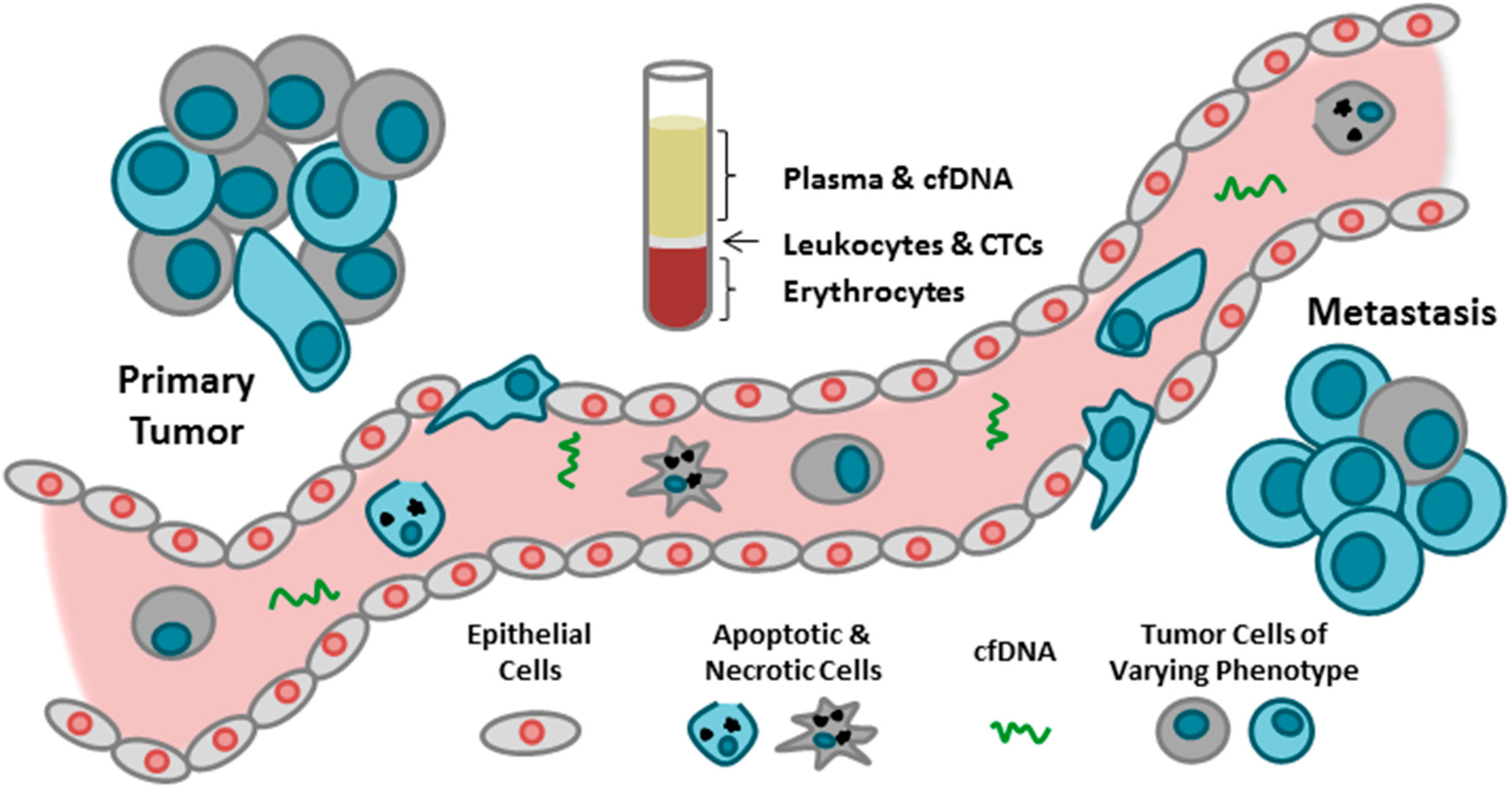1 oktober 2018: U kunt ook zelf uw circulerende tumorcellen laten testen bij de RCGG groep.
Wij vermelden al eerder dat verschillende complementair werkende artsen aanbieden zo'n aanvraag te doen
U moet dat waarschijnlijk wel zxlf betalen en of deze testen betrouwbaar zijn durf ik niet te zeggen. Maar er staat nog meer informatie daarover op de website van een ziekenhuis in Amerika met ook prijzen enz..
Ook Wikipedia heeft informatie over deze testen
11 september 2018: Bron: Journal of Clinical Oncology
Mensen met kanker hebben vaak in bloed circulerende tumorcellen waarvan inmiddels ook het DNA kan worden vastgesteld. Uit een studie bij 217 patiënten met een zogeheten diffuus grootcellig lymfoom, een vorm van lymfklierkanker ook wel B-cell lymfomen genoemd, blijken de DNA metingen van in bloed circulerende tumorcellen een sterk voorspellende waarde te hebben wat betreft de effectiviteit van een behandeling. Ik kan niet vinden over welke behandeling het gaat maar het gaat denk ik over alle behandelingen want er wordt gesproken in het abstract over zowel een curatieve behandeling als een palliatieve behandeling. En dan over de veranderingen in de zogeheten (bio)moleculaire waarden van een tumorcel.
 Source: http://www.mdpi.com/1422-0067/17/9/1505
Source: http://www.mdpi.com/1422-0067/17/9/1505
Voor de therapie was in bloed circulerende tumorDNA (ctDNA) te meten bij 98% van de patiënten; de waarden voor de behandeling startte waren voorspellend in de effectiviteit in zowel de curatieve- als de palliatieve behandelingen. Daarna veranderden de DNA metingen heel snel na al 1 behandeling en ook na een tweede behandeling veranderden de DNA metingen.
Uit al die metingen bleek dat de patiënten die een eerstelijnsbehandeling kregen en die een EMR (early molecular response of major molecular response (MMR) bereikten, superieure resultaten bereikten na 24 maanden (EMR: EFS, 83% versus 50%; P = .0015; MMR: EFS, 82% versus 46%; P < .001).
Patienten met een EMR voorspelde ook superieure uitkomsten na 24 maanden bij patiënten die een palliatieve behandeling kregen bij de eerste meting (EFS, 100% tegen 13%; P = .011).
De onderzoekers concludeerden dan ook in multivariabele analyses, waaronder International Prognostic Index en interim positron emissie tomografie / computertomografie scans in beide groepen patienten, dat de moleculaire respons een onafhankelijke voorspeller was voor de effectiviteit en resultaten, inclusief progressievrije ziekte en overall overleving.
Het volledige studierapport: Circulating Tumor DNA Measurements As Early Outcome Predictors in Diffuse Large B-Cell Lymphoma is tegen betaling in te zien.
Hier het abstract van de studie:
Circulating Tumor DNA Measurements As Early Outcome Predictors in Diffuse Large B-Cell Lymphoma
D.M.K. and F.S. contributed equally to this work.
M.D. and A.A.A. contributed equally as senior authors to this work.
Gerelateerde artikelen
- Combinatie van zes geneesmiddelen (BrECADD) resulteert in betere overleving met minder bijwerkingen bij patiënten met gevorderde lymfklierkanker van het type Hodgkinlymfoom in vergelijking met BEACOPP regiem
- Fludarabine-melfalan (Flu-Mel140) voorafgaand aan allogene stamceltransplantatie voor patienten met non-Hodgkin geeft hoger sterfterisico vergeleken met fludarabine-intraveneuze busulfan
- Bendamustine plus Rituximab gevolgd door behandelingen met 90-Yttrium plus 4x Ibritumomab Tiuxetan voor onbehandelde Folliculaire Lymfomen geeft betere overall overleving en langere duurzame ziektevrije tijd
- Behandeling met 1 medicijn is effectiever (CR: 41 vs 19 procent) dan combinatie van medicijnen bij agressieve vorm van lymfklierkanker (Peripheral T-cell Lymphoma).
- Lenalidomide naast rituximab verbetert mediane progressievrije overleving met 25 maanden (39 vs 14 maanden) bij patienten met recidief van indolente lymfomen - lymfklierkanker, in vergelijking met alleen rituximab copy 1
- DNA mutaties: In bloed circulerende tumor DNA metingen geven vooraf en al na 1 behandeling een uitstekende prognose op de uiteindelijke effectiviteit van een behandeling van zogeheten diffuus grootcellig lymfoom - B-Cell Lymfklierkanker
- Ibrutinib aanvullend op Bendamustine en Rituximab verbetert progressievrije ziekte en overall overleving met tientallen procenten bij Chronische Lymfatische Leukemia en recidief van lymfklierkanker met kleine tumoren
- Bendamustine plus rituximab (Rituxin) geeft verdubbeling van ziektevrije tijd, betere overleving met minder bijwerkingen voor patiënten met nieuw gediagnosticeerde lymfklierkanker - non-Hodgkin en mantelcellymfomen, in vergelijking met de R-CHOP kuren
- Chemo en bestraling: 2x bestralen na 2x chemo bij lymfklierkanker - Hodgkin lymfoom geeft zelfde resultaat op ziektevrije tijd en recidiefkansen als 4x bestralen, maar veel minder kans op ernstige bijwerkingen en latere complicaties.
- Chemo: Een combinatiebehandeling van Fludarabine, cyclophosphamide, en rituximab geeft significant betere resultaten op tijd tot progressie van de ziekte en op overleving bij non-Hodgkin en CLL - Chronische Lymfatische Leukemie.
- chemo combinatie doxorubicin, cyclophosphamide, vindesine, bleomycin, en prednisone (ACVBP) geeft significant betere resultaten, langere overlevingstijd, dan de chemocombinatie cyclophosphamide, doxorubicin, vincristine
- Chemo en effect bij mantelcel lympfomen: Met een aanpak van eerst een eenmalige toediening van Rituximab plus cyclophosphamide, vincristine, doxorubicin en dexamethason (hyper CVAD) gevolgd door Rituximab plus hoge dosis methotrexate-cytarabine worden hog
- Chemo en effect bij lymfklierkanker: Rituximab - Mabthera toegevoegd aan CHOP behandeling bij lymfeklierkanker - B-cel lympfomen geeft superieure resultaten blijkt uit gerandomiseerde fase III studie.
- Chemo en effect bij lymfklierkanker: Patiënten met ziekte van Hodgkin gebaat bij nieuwe chemomix - BEACOPP met verhoogde dosis - en niet gebaat bij aanvullende radiotherapie/bestraling na chemo aldus twee gerandomiseerde langjarige studies. copy 1
- Chemo en bestraling voor lymfklierkanker - Non-Hodgkin en ziekte van Hodgkin - geeft groot risico op latere nieuwe vormen van kanker. Bij jonge vrouwen 136 keer grotere kans op borstkanker bv. aldus studieverslagen in de Lancet.
- Mabthera - Rituximab - Rituxan blijkt beste aanpak voor lymfklierkanker: enkele studies bij elkaar gezet
- Chemo en effecten bij lymfklierkanker: een overzicht van ontwikkelingen binnen reguliere oncologie van afgelopen tien jaar



Plaats een reactie ...
Reageer op "DNA mutaties: In bloed circulerende tumor DNA metingen geven vooraf en al na 1 behandeling een uitstekende prognose op de uiteindelijke effectiviteit van een behandeling van zogeheten diffuus grootcellig lymfoom - B-Cell Lymfklierkanker"